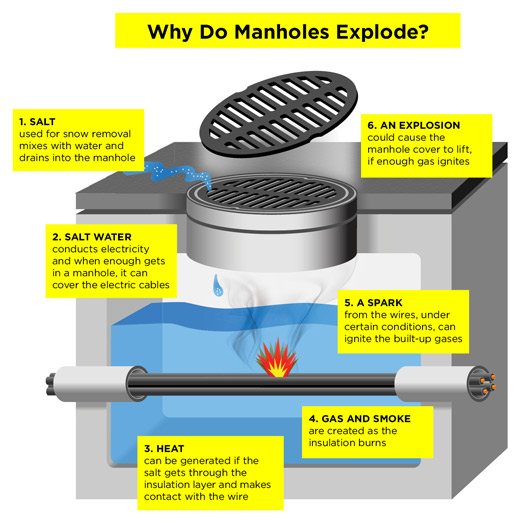
Electric Safety
Electrical Safety Tips Outside
If you see fallen power lines or damaged electrical equipment, call 1-800-75-CONED (1-800-752-6633) immediately. Do not touch it or try to fix it yourself.
Stay away from transmission line towers, utility poles, substation fences, and any other facility marked with "Danger High Voltage" signs.
Do not use extension cords or other electrical products outdoors unless they are specified for outdoor use.
If an electrical product falls into water, don’t touch it. If you and the plug are both dry, pull the plug, not the cord, from the outlet. Or, use the circuit breaker to shut off the power.
Do not fly kites in areas with overhead power lines.
If a power line falls on your car while you're in it, don't get out. The car's rubber tires provide protective insulation. Honk your horn, call for help, and wait for first responders. Tell others to stay away from the car while you wait for help.
When using a ladder near overhead wires, stay back at least 10 feet, use only a fiberglass ladder, and do not let the ladder come in contact with the wires. Never use a metal or wooden ladder near overhead lines. If the ladder starts to fall into an overhead line, let it fall, and call us at 1-877-434-4100 immediately.
Keep outdoor outlets covered and dry between uses.
Electrical Safety Tips at Home
Check electrical cords to ensure they don't have worn spots or frayed wires. Don't mend it—replace it! Homemade repairs are a common source of fires.
Use extension cords sparingly and only on a temporary basis. Too many appliances plugged into one cord causes overheating. Overheated wires start one of every six home fires.
Don't place power cords under carpets, rugs, or furniture. Also, never staple or nail cords to walls, baseboards, or other objects.
Keep flammable materials away from lamps and heaters. Place electric heaters away from areas where someone might trip and fall.
Place electrical appliances a safe distance from sinks and tubs.
Do not retrieve electrical products that fall in water. If you and the plug are dry, pull the plug—not the cord—from the outlet, or use the circuit breaker to shut off the power.
Inspect electrical outlets on a regular basis. Look for overheating, loose connections, and corrosion. Outlets that have loose-fitting plugs can cause a fire.
Never remove the third prong from a plug to make it fit a two-prong outlet. You could get a shock.
If an outlet or switch wall plate is hot to the touch, immediately shut off the circuit and have a professional check it.
Replace missing or broken wall plates.
Install safety covers on unused outlets so children can't play with them.
Use surge protectors to safeguard appliances and electronics.
Don’t use appliances during electric lightning and/or thunderstorms. Unless it is an emergency, do not use phones with charging cords.
Know where your main electrical panel is so you can turn off the electricity in an emergency.
Space heaters should be plugged directly into an outlet without the use of extension cords.
Lithium batteries used for e-bikes and scooters should be charged outside your home.
Refrigerators and other large appliances should be plugged into an outlet without the use of extension cords.
If the circuit breaker kicks-off and you reset it and kicks off again, leave it off and contact a licensed electrician.
Manhole Safety
Most manhole fires are weather related. A mix of melting snow and road salt, or extreme hot weather, can cause electrical equipment in manholes to smoke or catch fire.
Manhole covers weigh between 70 to 300 pounds. Many are vented to allow gases to escape, rather than build up in the manhole, helping prevent explosions.
Keep pets away from lampposts, grates, and manhole covers, especially when it is cold and wet.

